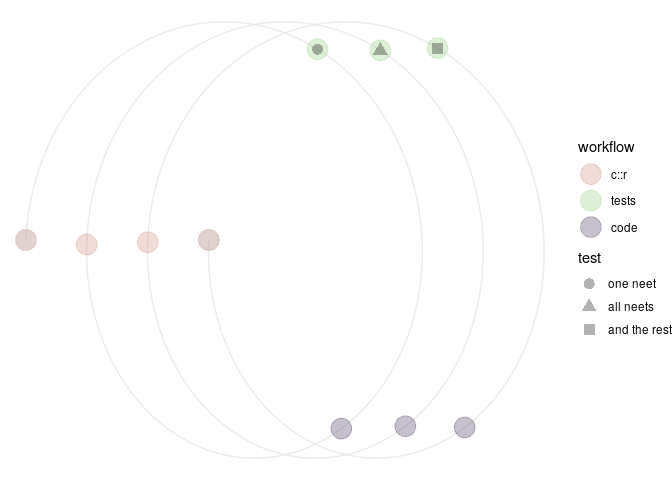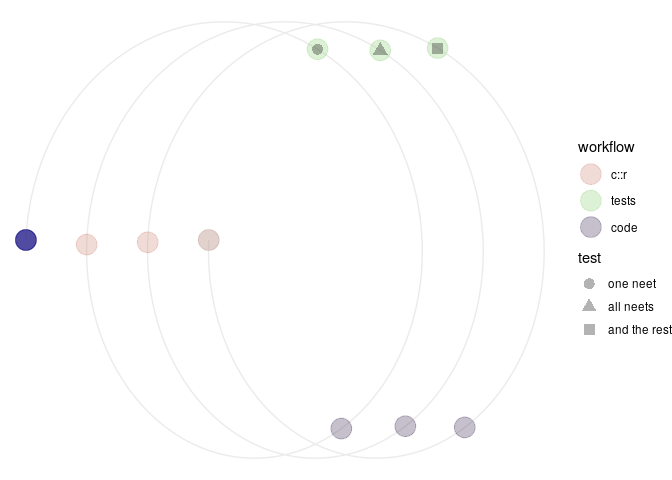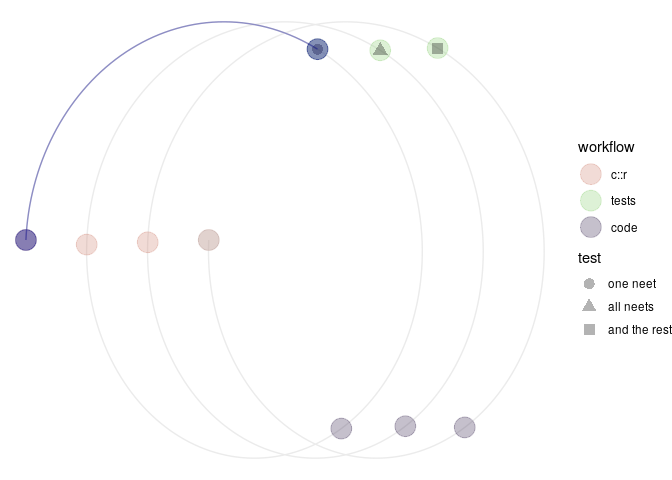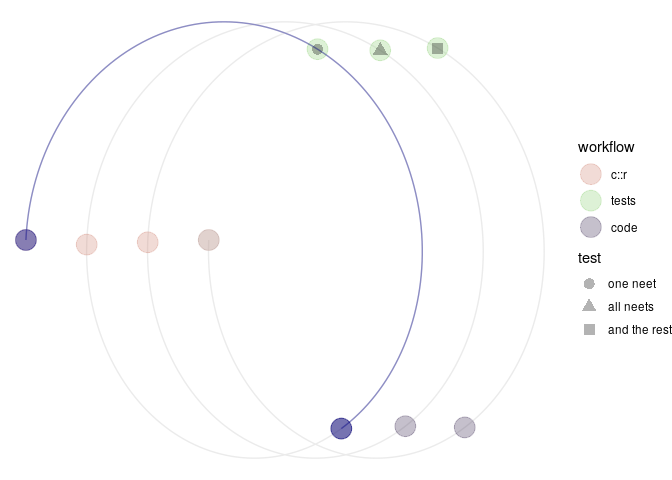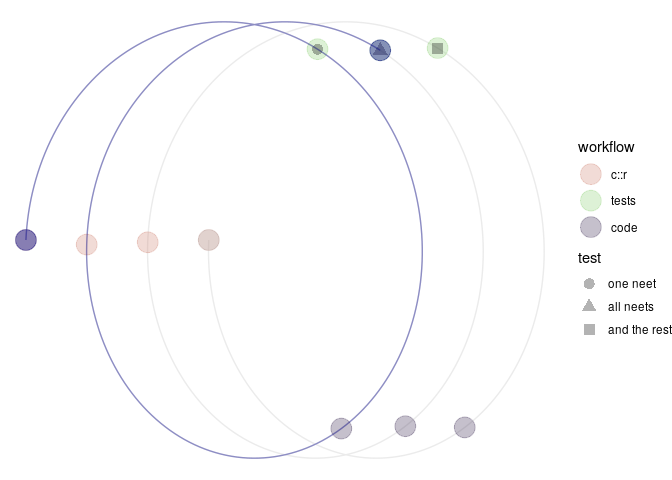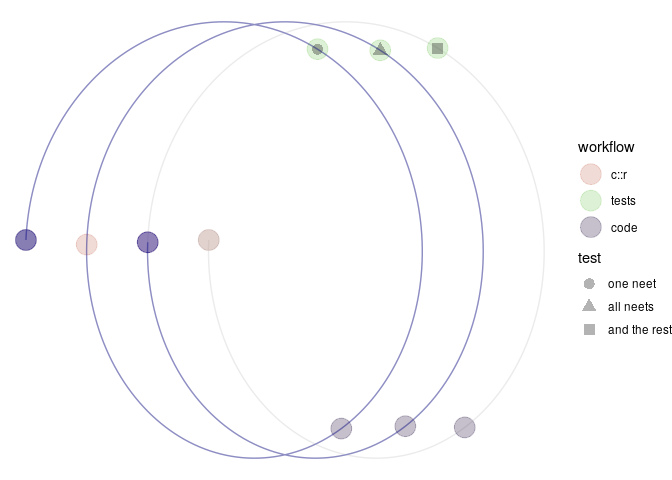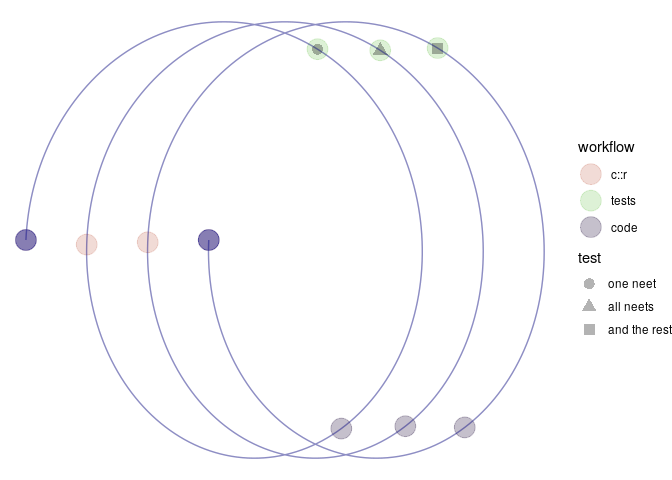Still not convinced of the utlity of this code. Perhaps better simply to
write an expect success as a neet. Trying it out, however, has been very
useful for adopting some level of test-driven
development.
One particular drawback of this code is that it messes up the error line
when reporting, and that’s a massive drag when debugging. However, I
learnt a lot from building it.
A neet test tests for non-empty thing of expected type. This is what is referred to as a boundary condition test in RStudio’s primers (todo: citation).
These expectations are intended to integrate into minimal testing workflow for development of data analyses. When developing a function, we will need parameters, and structure of the pipeline. These tests enable the developer to feel reassured the pipeline’s functions are outputting non-empty thing of expected type, while the developer decides the best structure for an analysis pipeline.
A character string will be checked for being of string-length > 1.
A numeric is checked for not being NA, NULL, Inf, or -Inf.
A `list`` is checked for being of length > 1.
A data.frame is checked for having at least one row.
You can install the released version of neet from GitHub with:
# install devtools
install.packages(devtools)
# use devtools to install package from github
devtools::install_github("softloud/neet")library(testthat)
library(neet)
## basic example code
# assertions check inputs of code in function scripts
assert_neet(3, "numeric") # test numeric
#> [1] TRUE
assert_neet("cat", "character") # test character string
#> [1] TRUE
assert_neet(mtcars, "data.frame") # test data frame
#> [1] TRUE
# tests to check neet expectations in testthat files
test_neet(3, "numeric") # test numeric
test_neet("cat", "character") # test character string
test_neet(mtcars, "data.frame") # test data frameThe neet:: package supports a coding workflow.
workflow(0)This section describes the test-driven workflow presented above as a
code::proofed coding to doneness.
The model workflow comprises three stages, repeated three times, before
returning to the start, the code::registration. We use model to
suggest the workflow may be adapted for different use-cases.
Each phase consists of:
code::registration- tests
- code
The tests vary each time in complexity, so that the complete model cycle consists of ten phases of work:
code::registration
workflow(1)In an issue on GitHub:
- Describe the algorithm’s intended purpose.
- Describe the input parameters and how they will be tested.
- Describe the output parameters and how they will be tested.
A duck that "quack"s.
Nothing.
- one neet
- all neets
- and the rest
Character string “quack”.
neettests, one per function
workflow(2)Write a test to check the duck quacks at all. This test currently fails, because I have not written the code to make it pass, yet.
test_that(expect_match(duck(), "quack"))
#> Error in duck(): could not find function "duck"- code
workflow(3)Write code to make the test pass.
# write function
duck <- function() {"quack!"}And now no error message is returned.
test_that(expect_match(duck(), "quack"))
#> Error in duck(): could not find function "duck"code::registration
Either update or rewrite the code::registration. It becomes more
obvious what code needs to be written once the developer has spent some
time again with the function.
- one neet
- all neets
- and the rest
neettests, for all inputs for each function
workflow(5)Now consider all inputs. Since we have nothing, we might consider the case where there is something, and write a test that expects an error.
test_that("function fails with input", {
expect_error(duck(3))
})- code
The duck quacks sufficiently. No more code required!
code::registration
workflow(7)Either update or rewrite the code::registration.
- one neet
- all neets
- and the rest
- tests, and the rest, i.e., any other cases to test for
I am satisified with the test coverage.
- code
The duck quacks sufficiently.
code::registration
workflow(10)- one neet
- all neets
- and the rest
For the final code::registration, update the document for your future
self with details you may need when implementing new features.
